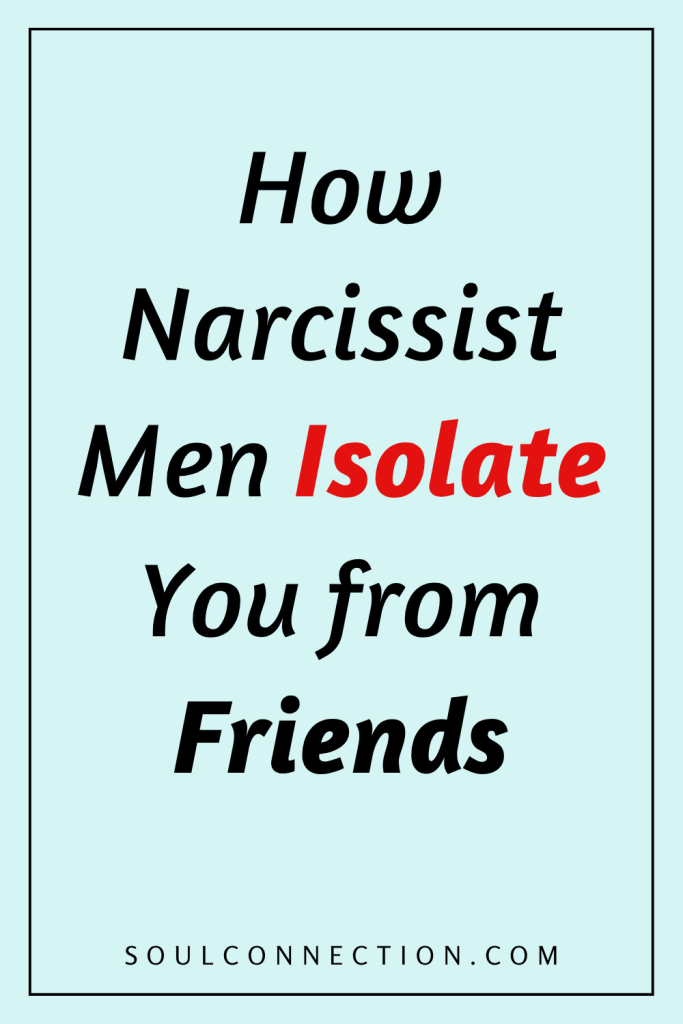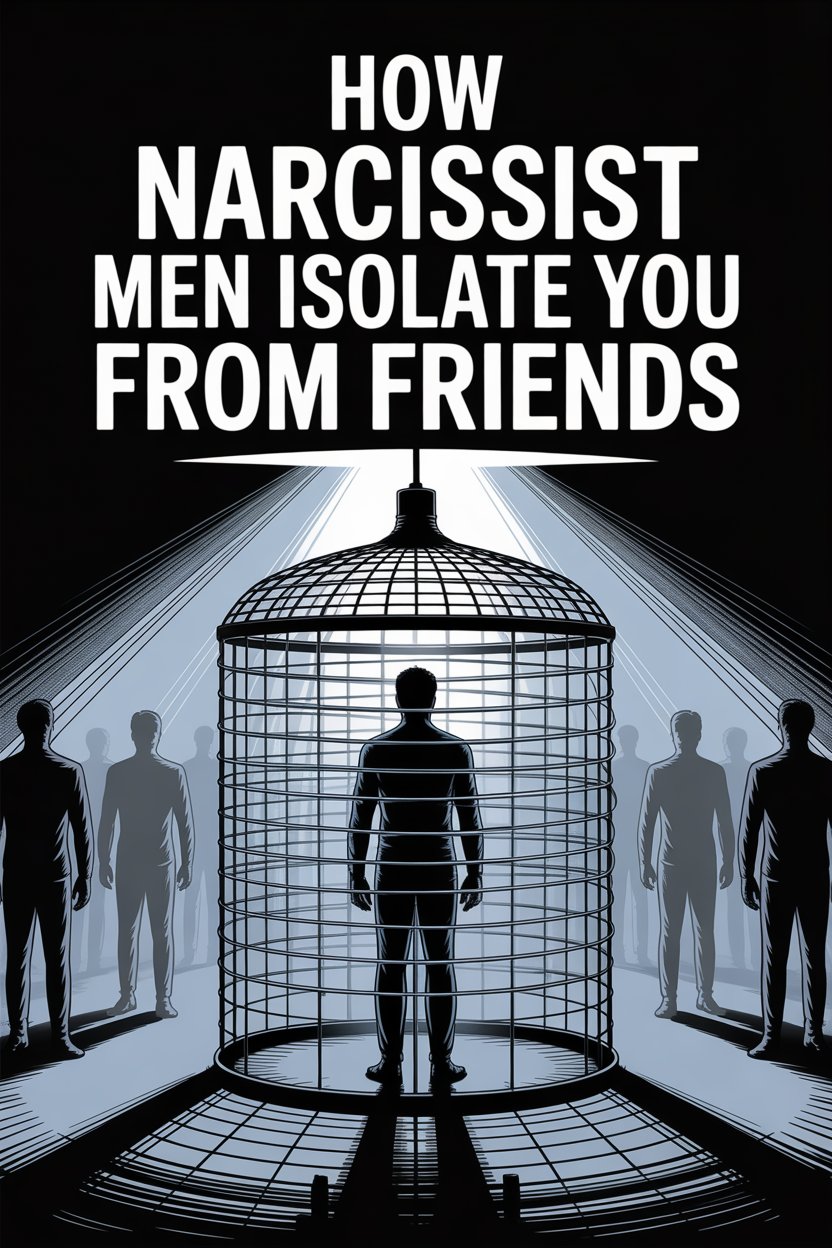Ever had a friend disappear from your group, only to resurface months (or years) later looking like they’ve just escaped a cult—except the cult was just their boyfriend? Welcome to the subtle art of isolation, narcissist edition.
Grab your mental magnifying glass. It’s time to unpack exactly how narcissistic men can whittle down your social life until it’s just you and their ego sharing a cup of cold tea.
The Slow Fade from Your Contacts List
Isolation rarely starts with a dramatic showdown where he declares, “No more brunches with Sarah!” It’s quieter. More like a slow trickle. Suddenly, the texts from your friends feel like an imposition.
Or maybe he sighs every time your phone pings. “Another group chat? Isn’t that a bit much?” Cue the guilt trip. Before you know it, you’re the one sending apologetic rain-checks while he looks on, satisfied.
It’s not always about direct orders. Sometimes, it’s about planting seeds: “They’re just jealous of what we have.” “Emily never really seemed to like me anyway.”
The next thing you know, you’re RSVP-ing ‘no’ to life itself.
The Art of Subtle Undermining
Narcissistic partners thrive on eroding your confidence in your friends. It’s not enough for him to be your favorite; he wants to be your only lifeline. This doesn’t look like an obvious ban. It’s a steady stream of commentary.
“Did you notice how Dave only texts you when he needs something?”
“Wow, Anna’s really self-centered, isn’t she?”
“Your friends don’t really get our relationship like I do.”
Eventually, their negative running commentary becomes the voice in your own head. You start seeing flaws in your friends that weren’t there before—at least, not until he pointed them out.
Suddenly, you’re doubting these relationships, even the ones that held you together way before he sauntered in with his cologne and confidence.
Picking Fights Before Plans
Few things sabotage friendships faster than last-minute drama. Planning a girls’ night? Suddenly, he’s in a mood. Family dinner approaching? He’s mysteriously “not feeling well.”
These emotional emergencies have impeccable timing—just as you’re reaching for your coat.
It’s not always a full-blown tantrum. Sometimes it’s a wounded look, a passive-aggressive sigh, or the classic, “Yeah… I guess I’ll just hang here by myself.”
The message is clear: your time belongs to him, and any time spent elsewhere is a personal affront.
Eventually, the stress of anticipating his reaction makes it easier to just cancel. Fewer plans, fewer fights, less resistance. Mission accomplished.
The Guilt Trip Olympics
Narcissists could medal in guilt trips. Every outing with friends becomes an exercise in emotional gymnastics. He’ll say he “just misses you” or wonders why you need anyone else when you have him.
Sometimes, there’s self-pity: “I thought tonight was supposed to be our time.” Translation: how dare you have a life that isn’t 100% about him?
Before long, you’re apologizing for things that shouldn’t require an apology: catching up with a uni friend, FaceTiming your sister, or attending a birthday dinner.
Even when you do go, it hardly feels worth the tension waiting for you when you get home.
Playing the Victim Card
He’s misunderstood. He’s the outsider. He’s “never really felt accepted” by your social circle. He’s not just isolating you; apparently, the world is doing it to him, too.
Now you’re caught in a tug-of-war, trying to prove his worth to your friends or, more likely, to yourself.
You start withdrawing from people who “just don’t get it” (read: don’t like him), and soon enough, your contact list is whittled down to people who either tolerate him or have lost the energy to fight for you.
Surveillance, But Make It Subtle
Invasive questions become the norm. “Who was there? What did you talk about? Did anyone ask about me?”
Maybe he checks your phone (just to “see if it’s charging,” bless his soul), or keeps tabs on your social media likes and comments with the precision of a private investigator.
If you protest, he acts offended—“I just care about you!”—while your privacy gets smaller and smaller. The more you explain, the guiltier you feel for simply seeing friends. Eventually, it’s easier to avoid the interrogation by staying home.
Smearing Your Support System
Narcissists are never short on drama. If someone challenges their behavior, that person gets painted as the villain. Your best friend who questions his “jokes” is suddenly “manipulative” or “toxic.” Your mum, who doesn’t trust him, is “controlling.”
His goal: make you second-guess the people who might actually see through his act. Once the seeds of doubt are sown, the garden of your social life gets a lot less lively.
Love Bombing as a Diversion Tactic
Ever notice how he turns up the charm whenever you’re considering a night out with friends? Suddenly, there are surprise date nights, gifts, or heartfelt confessions of love—anything to keep your attention squarely on him.
It feels intoxicating, flattering even. But underneath the grand gestures is a strategy: why go to game night with friends when you can bask in his sudden, overwhelming affection?
The high is real, until the next time you hint at making plans that don’t involve him.
Turning Friends into Enemies
No actual daggers required. He might sow suspicion by suggesting friends are jealous, untrustworthy, or out to ruin your relationship. Maybe he hints that your friends have been gossiping about you, or questions their loyalty.
This manufactured paranoia can make even the most solid friendships feel unstable.
Soon, the people who would ordinarily have your back start to look like threats. Keeping your circle small becomes “self-care”—or so he’d have you believe.
Insisting on “Us Against the World”
Isolation loves a good romance novel trope. He’ll frame your relationship as a battle, where only the two of you understand each other. “No one gets us. It’s always been us against everyone else.”
It sounds passionate, Bonnie and Clyde style. Less romantic when it means ditching your mates.
Framing your relationship as a fortress against a hostile world is just another way to cut you off from the people who might notice the fortress’s windows are actually just painted on.
Signs It’s Happening to You
Not sure if your partner’s behavior qualifies as isolation? Red flags aren’t always bright and obvious. Check in with yourself:
- Do you feel anxious before making plans with friends?
- Has your social circle shrunk, not out of life changes, but because it feels easier to avoid conflict?
- Do you find yourself defending him to people who care about you?
- Is your partner the gatekeeper to your fun, your free time, or your peace of mind?
If any of these hit a nerve, isolation might be more than just a hunch.
Rebuilding Your Social Life (Without Causing a Scene)
Escaping the narcissist isolation trap isn’t about staging a dramatic intervention (unless you want to, in which case bring snacks). Start by preserving your connections in small, manageable ways.
Send a text to an old friend. Reply to the group chat, even if it’s just a meme. Accept the invitation, even if you feel nervous. Every contact counts.
If your partner protests, stand your ground—no explanations, no guilt trips.
And if you need support, don’t be afraid to reach out to a therapist or support group. There are more people rooting for you than you think.
The Freedom in Saying No
Isolation feeds on compliance. The more you agree, the easier it is for a narcissist to set up invisible fences around your life. Disagreement—no matter how small—can be a revolutionary act.
Try it out. Say no to the last-minute guilt trip. Say yes to hanging out with friends, even if he sulks. Watch the power dynamic shift.
He might ramp up the drama, or he might back off (temporarily, at least). Either way, every “no” to isolation is a “yes” to yourself.
Knowing When It’s Not Just a Rough Patch
It’s tempting to write off isolation as just a phase, something every couple goes through. But ongoing efforts to separate you from your friends isn’t a quirk—it’s a warning sign.
If you feel less like yourself and more like a supporting character in his story, it’s time to reassess. Real love shouldn’t require you to shrink your world down to a single person.
Finding Your Way Back
Breaking out of isolation isn’t easy—especially when you’ve been trained to believe everyone else is the problem. Start where you are. Reconnect with people who care, even if you have to start small.
Give yourself permission to miss the people and activities that brought you joy. You’re not being unreasonable or dramatic for wanting a life outside his gravitational pull.
The best relationships add to your world. Anyone who tries to shrink yours down for their own benefit deserves—at the very least—a healthy dose of distance. Often, a permanent one.
And if you ever find yourself making excuses for why it’s normal to lose all your friends for one man, ask yourself: would a truly loving partner ever make you choose?
Reclaiming Your Social Life
Freedom doesn’t have to be a grand exit. It starts with a single message, a coffee date, or an honest conversation with someone who knows the real you.
Remember who you were before isolation set in, and trust that version is still there—probably just buried under a pile of cancelled plans and second-guessing.
Reclaim your group chat. Reclaim your Saturday nights. Reclaim your loudest, most unfiltered laugh.
No narcissist required.


